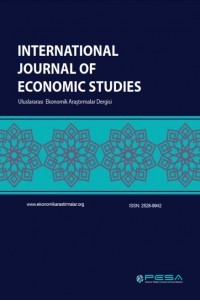Considering Environmental Policy in Development of Tourism Sector in Georgia
Considering Environmental Policy in Development of Tourism Sector in Georgia
Environmental area, Tourist product, Recreation resources, Tourism industry World Tourism Organization,
___
- Abegg, B. (1996) Klimaanderung und Tourismus. Zurich: Schlussbericht NFP 31. Vdf verlag. AG an der ETH. pp. 57-68
- Amiranashvili A, Matzarakis A., and Kartvelishvili L., (2008). „Tourism Climate Index in Tbilisi“, Trans of the institute of hydrometeorology, 115. pp. 27-32.
- Georgia‟s third National Communication to the UNFCCC, Tbilisi, 2015, pp. 210-235.
- Matzarakis, A. (2006) „Weather - and Climate-Related Information for Tourism‟, Tourism and Hospitality Planning & Development, 3(2), pp. 25-35.
- Mieczkowski, Z.(1985) „The Tourism Climate Index: A Method for Evaluating World Climate for tourism, The Canadian Geographer pp. 24-28.
- Gilleland, E. and Katz, R.W., (2006): Analyzing seasonal to inter-annual extreme weather and climate variability with the Extremes Toolkit. Preprints: 18th Conference on climate variability and Change, pp. 35-46. .
- ISSN: 2528-9942
- Başlangıç: 2015
- Yayıncı: Politik Ekonomik ve Sosyal Araştırmalar Merkezi
Considering Environmental Policy in Development of Tourism Sector in Georgia
How Does Financial Development Effects on Economic Growth in BRICS Countries?
Gaziantep Şehrinde Kongre Turizminin Mevcut Durumu ve Geliştirilmesine Yönelik Bir Saha Araştırması
İbrahim GİRİTLİOĞLU, Barış ARMUTCU
An Analysis on the Validity of Okun's Law: Case of Turkey and BRICS
Ferhat PEHLİVANOĞLU, Marvin TANGA
Turn-of-the Year Affect in Gold Prices: Decomposition Analysis
The Changing Structure of the Concept of Capital: Cognitive Social Capital
